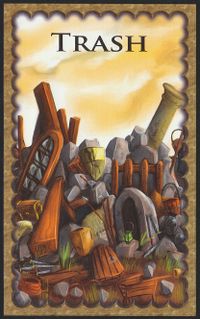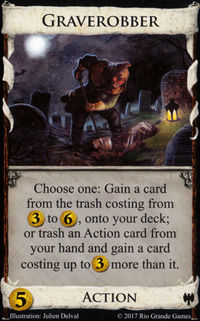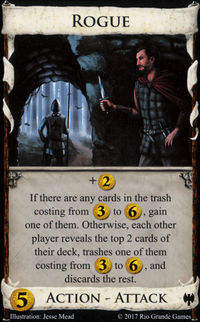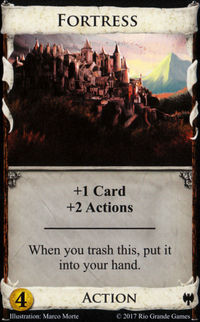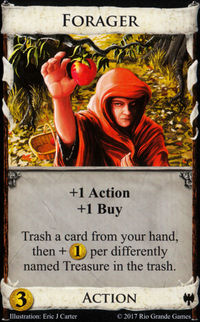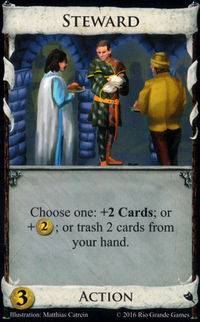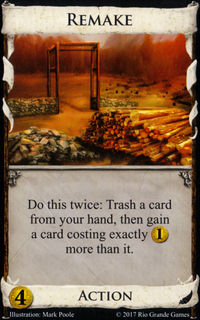Trash
Werothegreat (Talk | contribs) |
Werothegreat (Talk | contribs) |
||
| Line 2: | Line 2: | ||
[[Image:Trash2.jpg|thumb|right|200px|Trash pile card with alternate art from the [[Base Cards]] set.]] | [[Image:Trash2.jpg|thumb|right|200px|Trash pile card with alternate art from the [[Base Cards]] set.]] | ||
| − | To '''trash''' is to remove a card from your deck, placing it in an area called the ''trash'' or ''trash pile''. This is distinct from [[discard|discarding]], which removes a card from your hand or other area to your discard pile, waiting to be shuffled back into your deck. Trashing a card usually means removing it permanently from your deck, although there are a small number of cards, chiefly {{Card|Graverobber}} and {{Card|Rogue}}, that can retrieve a card from the trash, and one card, {{Card|Fortress}}, which can never leave your deck through trashing. In addition to these, {{Card|Forager}} has an effect that depends on what is in the trash. Cards that can send cards to the trash include [[trasher]]s and [[trashing attack|trashing Attack]]s; cards that trash themselves are often called [[one-shot]]s. | + | To '''trash''' is to remove a card from your deck, placing it in an area called the ''trash'' or ''trash pile''. This is distinct from [[discard|discarding]], which removes a card from your hand or other area to your discard pile, waiting to be shuffled back into your deck. Trashing a card usually means removing it permanently from your deck, although there are a small number of cards, chiefly {{Card|Graverobber}} and {{Card|Rogue}}, that can retrieve a card from the trash, and one card, {{Card|Fortress}}, which can never leave your deck through trashing. In addition to these, {{Card|Forager}} has an effect that depends on what is in the trash. There are also cards that give an effect when they are trashed. Cards that can send cards to the trash include [[trasher]]s and [[trashing attack|trashing Attack]]s; cards that trash themselves are often called [[one-shot]]s. |
== Trashers == | == Trashers == | ||
| + | There are currently 42 cards in the game that can trash another of your cards during your turn. Some simply trash cards as their only effect, while others give some benefit in addition, usually varying depending on the specific card trashed. | ||
== Trashing Attacks == | == Trashing Attacks == | ||
| Line 11: | Line 12: | ||
== Strategy == | == Strategy == | ||
| − | + | Trashing is a cornerstone of Dominion strategy; the ability to cull your deck of your weak starting cards ({{Card|Copper|Coppers}} and {{Card|Estate|Estates}} or [[Shelter]]s) is quite powerful, and players who trash early and often will usually trounce players who ignore trashing when it is available. Trashing your weak starting cards has the effect of making your deck [[cycle]] more rapidly and have a greater concentration of strong cards. To this end, cheap trashers that can trash more than one card, such as {{Card|Chapel}} (considered the most powerful card in the game for its cost) and {{Card|Steward}}, will typically be bought on the first two turns. However, trashing without simultaneously adding new cards of value to your deck, namely more expensive [[Treasure]]s and [[Action]]s, can leave you unable to do anything. Therefore, players must weigh whether they want the fastest possible trashing (Chapel), or a slower trasher that continues to be useful after all your starting cards have been trashed (Steward). | |
| + | |||
| + | Sometimes it is desirable to trash more valuable cards using so-called [[trash-for-benefit]] cards, which give greater benefits when trashing more valuable cards. Most are not as efficient at trimming down your deck, but the bonuses they provide counterbalance their slowness. {{Card|Remake}} manages to get the best of both worlds, combining relative speed, a cheap enough cost to open with, and the ability to turn your starting Estates into Silvers. | ||
| + | |||
| + | The most obvious use for trashers is to rid your deck of [[Junking attack|junk]] cards: {{Card|Curse|Curses}} and [[Ruins]]. While newer players don't always immediately understand the benefit of trashing Coppers and Estates, it's usually quite clear why they'd want to rid themselves of cards that give negative {{VP}}. While trashing is the obvious counter to junking, junking is actually more often a counter to trashing. By throwing Curses or other cards into your opponent's deck, you're giving them more cards they have to trash, and while all the junker has to do is draw their [[Attack]], the trasher has to manage to line their trashing card up with the junk they've received. | ||
{{stub}} | {{stub}} | ||
{{Navbox Mechanics}} | {{Navbox Mechanics}} | ||
Revision as of 11:37, 27 January 2015
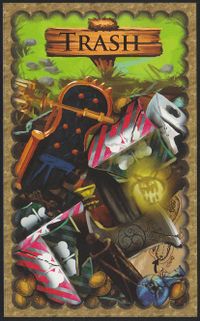
To trash is to remove a card from your deck, placing it in an area called the trash or trash pile. This is distinct from discarding, which removes a card from your hand or other area to your discard pile, waiting to be shuffled back into your deck. Trashing a card usually means removing it permanently from your deck, although there are a small number of cards, chiefly Graverobber and Rogue, that can retrieve a card from the trash, and one card, Fortress, which can never leave your deck through trashing. In addition to these, Forager has an effect that depends on what is in the trash. There are also cards that give an effect when they are trashed. Cards that can send cards to the trash include trashers and trashing Attacks; cards that trash themselves are often called one-shots.
Contents |
Trashers
There are currently 42 cards in the game that can trash another of your cards during your turn. Some simply trash cards as their only effect, while others give some benefit in addition, usually varying depending on the specific card trashed.
Trashing Attacks
When-trash
Strategy
Trashing is a cornerstone of Dominion strategy; the ability to cull your deck of your weak starting cards (Coppers and Estates or Shelters) is quite powerful, and players who trash early and often will usually trounce players who ignore trashing when it is available. Trashing your weak starting cards has the effect of making your deck cycle more rapidly and have a greater concentration of strong cards. To this end, cheap trashers that can trash more than one card, such as Chapel (considered the most powerful card in the game for its cost) and Steward, will typically be bought on the first two turns. However, trashing without simultaneously adding new cards of value to your deck, namely more expensive Treasures and Actions, can leave you unable to do anything. Therefore, players must weigh whether they want the fastest possible trashing (Chapel), or a slower trasher that continues to be useful after all your starting cards have been trashed (Steward).
Sometimes it is desirable to trash more valuable cards using so-called trash-for-benefit cards, which give greater benefits when trashing more valuable cards. Most are not as efficient at trimming down your deck, but the bonuses they provide counterbalance their slowness. Remake manages to get the best of both worlds, combining relative speed, a cheap enough cost to open with, and the ability to turn your starting Estates into Silvers.
The most obvious use for trashers is to rid your deck of junk cards: Curses and Ruins. While newer players don't always immediately understand the benefit of trashing Coppers and Estates, it's usually quite clear why they'd want to rid themselves of cards that give negative ![]() . While trashing is the obvious counter to junking, junking is actually more often a counter to trashing. By throwing Curses or other cards into your opponent's deck, you're giving them more cards they have to trash, and while all the junker has to do is draw their Attack, the trasher has to manage to line their trashing card up with the junk they've received.
. While trashing is the obvious counter to junking, junking is actually more often a counter to trashing. By throwing Curses or other cards into your opponent's deck, you're giving them more cards they have to trash, and while all the junker has to do is draw their Attack, the trasher has to manage to line their trashing card up with the junk they've received.
| This article or section is a stub. Please help by expanding it |
